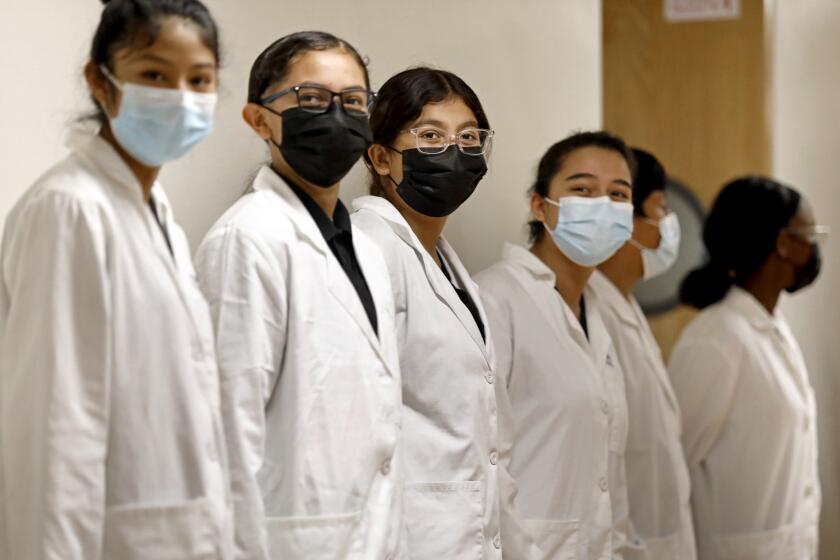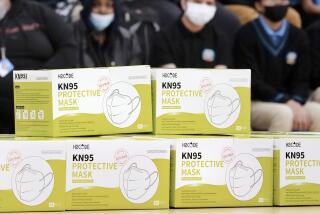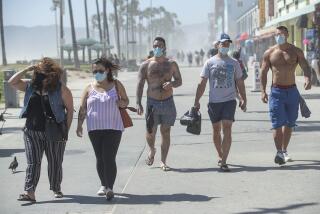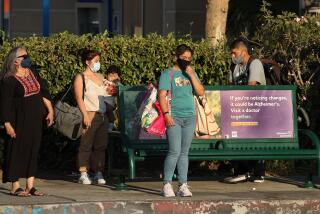Florida judge voids U.S. mask mandate for planes, other travel
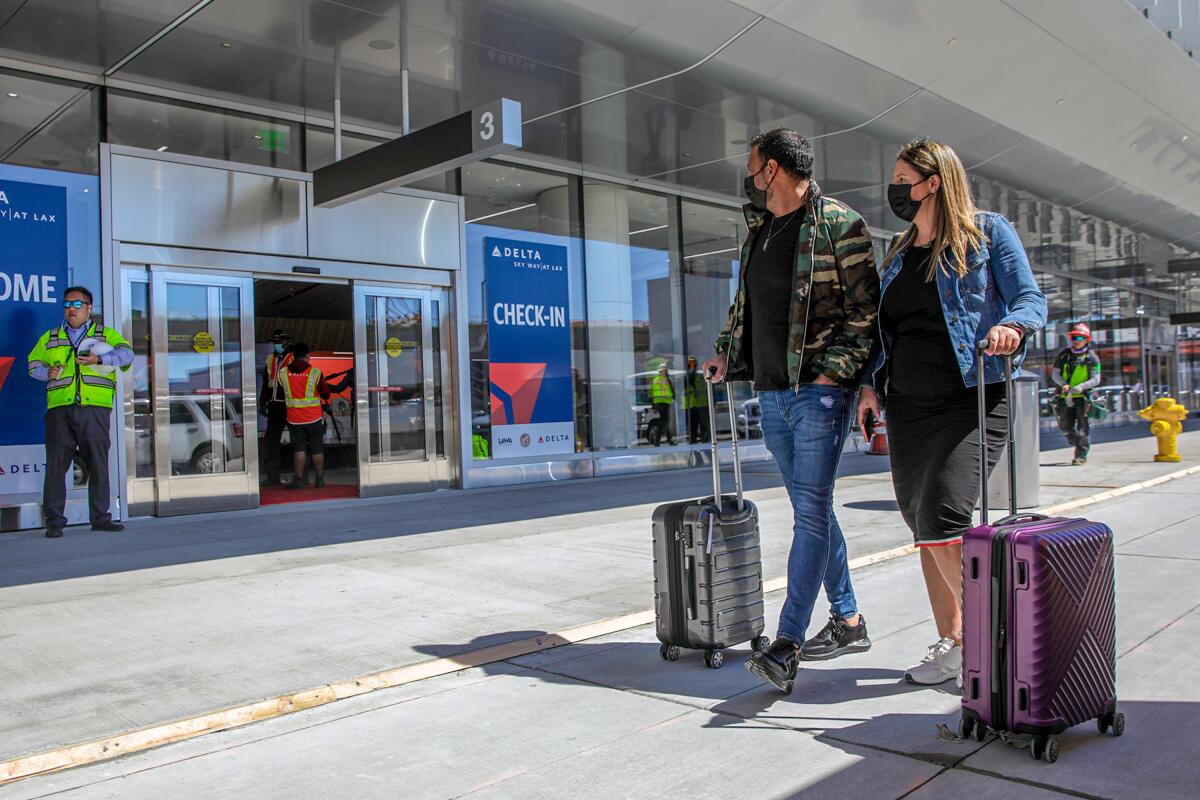
- Share via
ST. PETERSBURG, Fla. — A federal judge in Florida on Monday voided the national mask mandate covering airlines and other public transportation as exceeding the authority of U.S. health officials in their response to the COVID-19 pandemic.
The White House said the court ruling means that for now the mask order “is not in effect at this time.”
The ruling appeared to free operators to make their own decisions about mask requirements, with several airlines announcing they would drop mandates but the New York City subway planning to keep one in place.
United Airlines said in a statement that, effective immediately, masks would no longer be required on domestic flights or certain international flights.
“While this means that our employees are no longer required to wear a mask — and no longer have to enforce a mask requirement for most of the flying public — they will be able to wear masks if they choose to do so, as the CDC continues to strongly recommend wearing a mask on public transit,“ United said.
Delta Air Lines and Alaska Airlines also made similar announcements.
Sleepy passengers on a Delta Air Lines flight between Atlanta and Barcelona, Spain, cheered and applauded when a flight attendant announced the news mid-flight over the ocean.
“No one’s any happier than we are,“ the attendant says in a video posted by Dillon Thomas, a CBS Denver reporter, who was on the flight. She added that people who wanted to keep on their masks were encouraged to do so.
The Transportation Security Administration said Monday night that it would no longer enforce the mask requirement, and airports in Houston and Dallas almost immediately did away with their mandates after the TSA announcement. LAX also dropped its mandate but the Centers for Disease Control continued to recommend masking on transportation “and I think that’s good advice,“ LAX spokesman Heath Montgomery said.
The mandate, recently extended by the U.S. Centers for Disease Control and Prevention, covered a vast array of transportation, from airplanes and trains to city subways and ride-sharing vehicles such as Uber.
The decision by U.S. District Judge Kathryn Kimball Mizelle in Tampa, an appointee of former President Trump, also said the CDC improperly failed to justify its decision and did not follow proper rulemaking procedures that left it fatally flawed.
In her 59-page ruling, Mizelle said the only remedy was to vacate the rule entirely across the country because it would be impossible to end it for the limited group of people who objected in the lawsuit.
The judge said “a limited remedy would be no remedy at all” and courts have full authority to make a decision such as this — even if the goals of the CDC in fighting the virus are laudable.
“Because our system does not permit agencies to act unlawfully even in pursuit of desirable ends, the court declares unlawful and vacates the mask mandate,” she wrote.
The Justice Department declined to comment Monday when asked if the government planned to appeal the ruling. The CDC also declined to comment.
White House press secretary Jen Psaki told reporters that federal agencies were still assessing the court decision Monday afternoon.
“This is obviously a disappointing decision,” Psaki said, “The CDC is recommending wearing a mask on public transit.”
Republican Florida Gov. Ron DeSantis, who was not directly involved in the case but has battled against many government coronavirus requirements, praised the ruling in a statement on Twitter.
“Great to see a federal judge in Florida follow the law and reject the Biden transportation mask mandate. Both airline employees and passengers deserve to have this misery end,” DeSantis tweeted.
California is relaxing quarantine recommendations for people exposed to the coronavirus but remain asymptomatic. L.A. and other counties can keep stricter rules in place or follow the state’s COVID-19 guidance.
The CDC recently extended the mask mandate, which was set to expire Monday, until May 3 to allow more time to study the BA.2 omicron subvariant of the coronavirus that is now responsible for the vast majority of cases in the U.S.
The mandate covered all types of transportation in the U.S. as well as requiring masks in any transportation hub, such as an airport, seaport or bus terminal.
The Association of Flight Attendants, the nation’s largest union of cabin crews, has recently taken a neutral position on the mask rule because its members are divided about the issue. On Monday, the union’s president appealed for calm on planes and in airports.
“The last thing we need for workers on the frontlines or passengers traveling today is confusion and chaos,” union leader Sara Nelson said.
Nelson said it takes airlines 24 to 48 hours to put new procedures in place and tell employees about them. She said passengers should to check with airlines for updates about travel requirements.
In New York, Metropolitan Transportation Authority communications director Tim Minton said, “We are continuing to follow CDC guidelines and will review the Florida court order.”
The MTA operates New York City buses and subway trains as well as two commuter rail lines. Face coverings have been mandatory on all trains and buses since early in the pandemic.
The federal mask requirement for travelers was the target of months of lobbying from the airlines, which sought to kill it. The carriers argued that effective air filters on modern planes make transmission of the virus during a flight highly unlikely. Republicans in Congress also fought to kill the mandate.
Critics have seized on the fact that states have rolled back rules requiring masks in restaurants, stores and other indoor settings, and yet COVID-19 cases have fallen sharply since the Omicron variant peaked in mid-January.
There have been a series of violent incidents on aircraft that have mainly been attributed to disputes over the mask-wearing requirements.
The lawsuit was filed in July 2021 by two plaintiffs and the Health Freedom Defense Fund, described in the judge’s order as a nonprofit group that “opposes laws and regulations that force individuals to submit to the administration of medical products, procedures and devices against their will.”
Associated Press writers David Koenig in Dallas, Michael Balsamo and Will Weissert in Washington, and Karen Matthews in New York contributed to this story.
More to Read
Sign up for Essential California
The most important California stories and recommendations in your inbox every morning.
You may occasionally receive promotional content from the Los Angeles Times.
